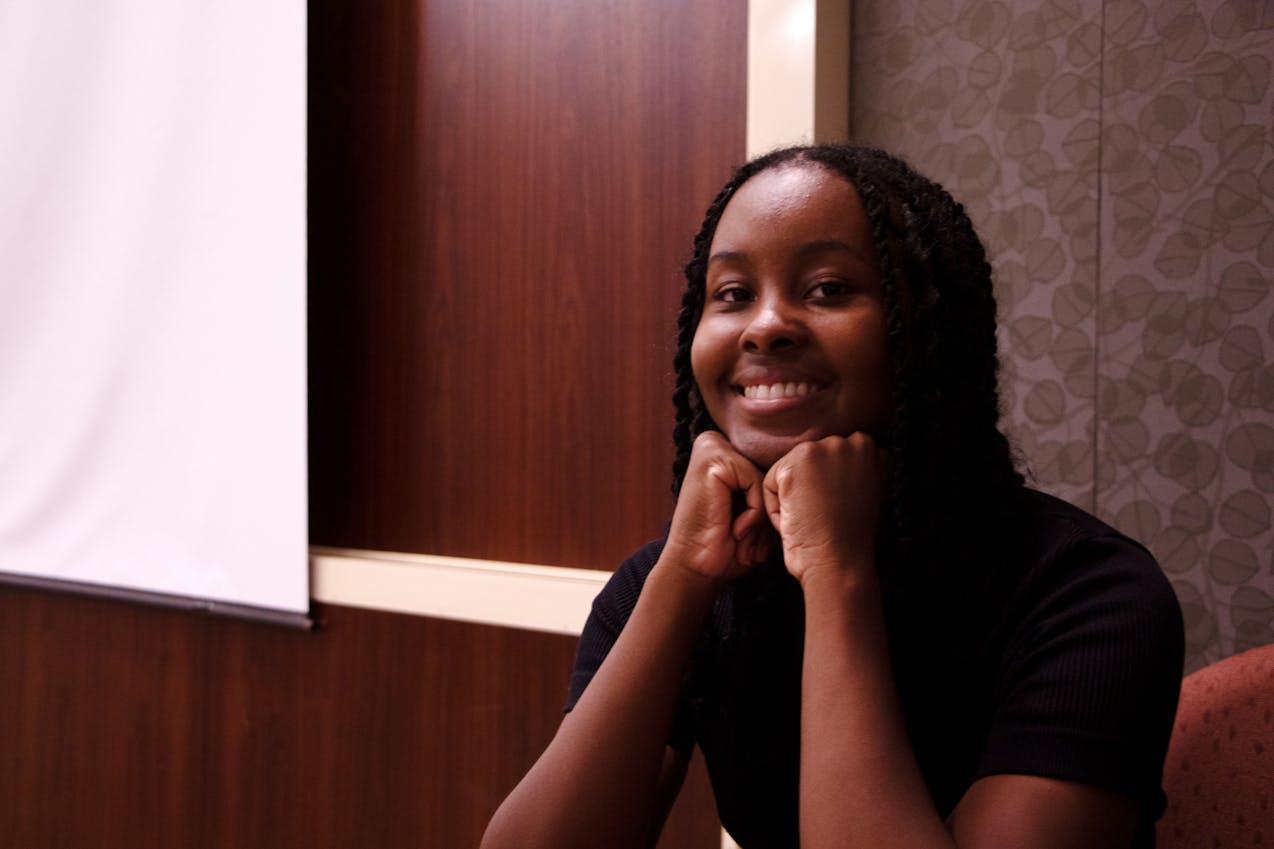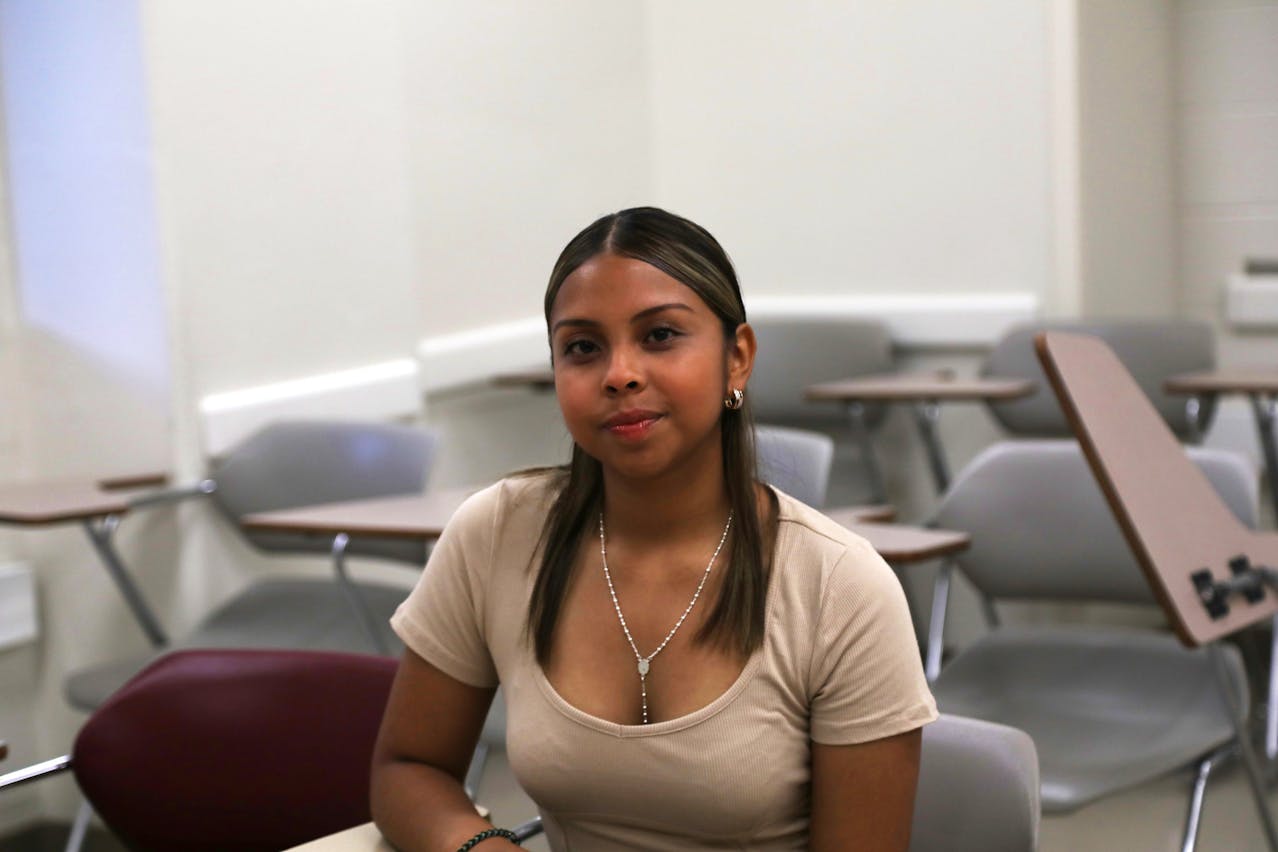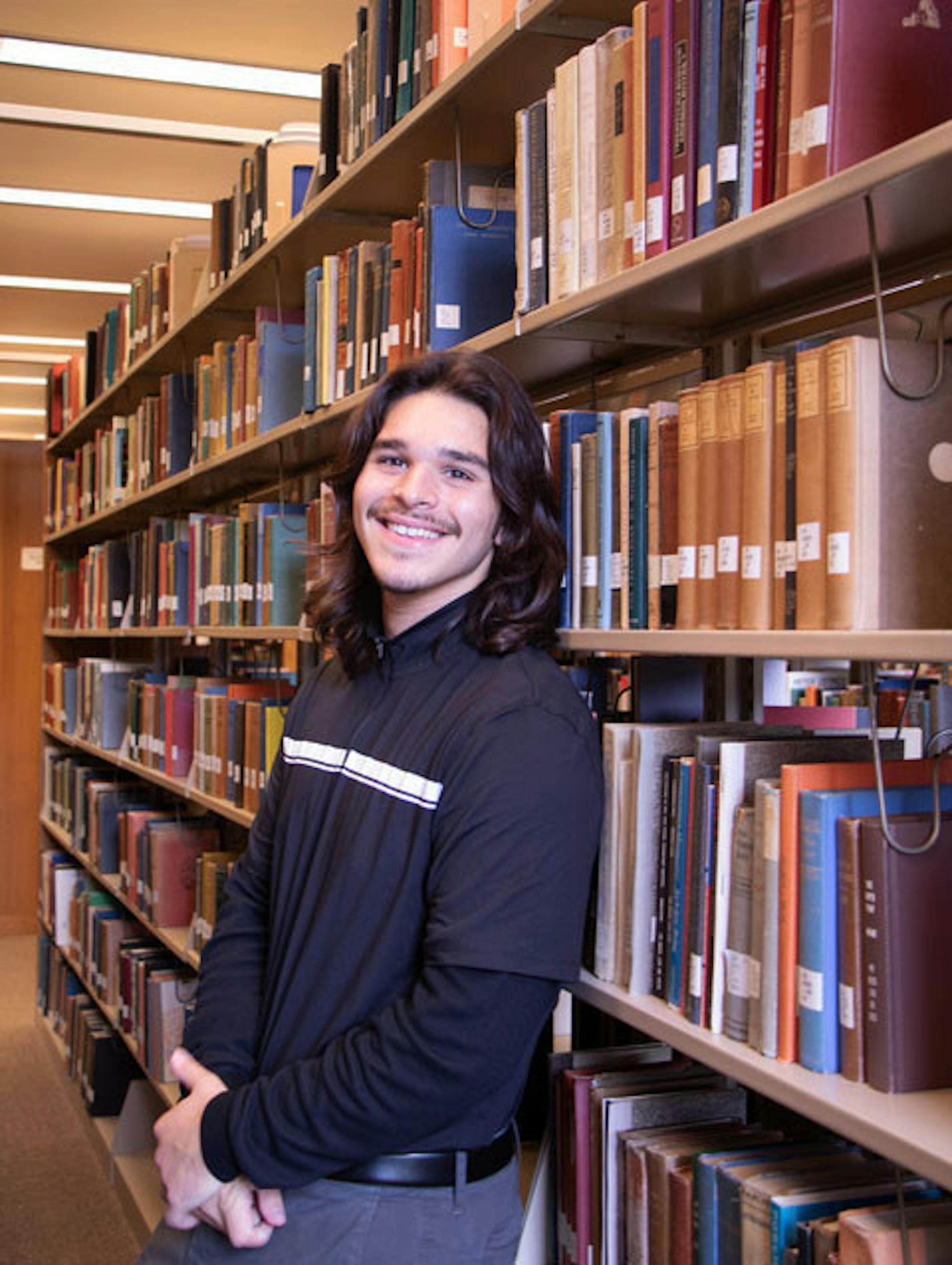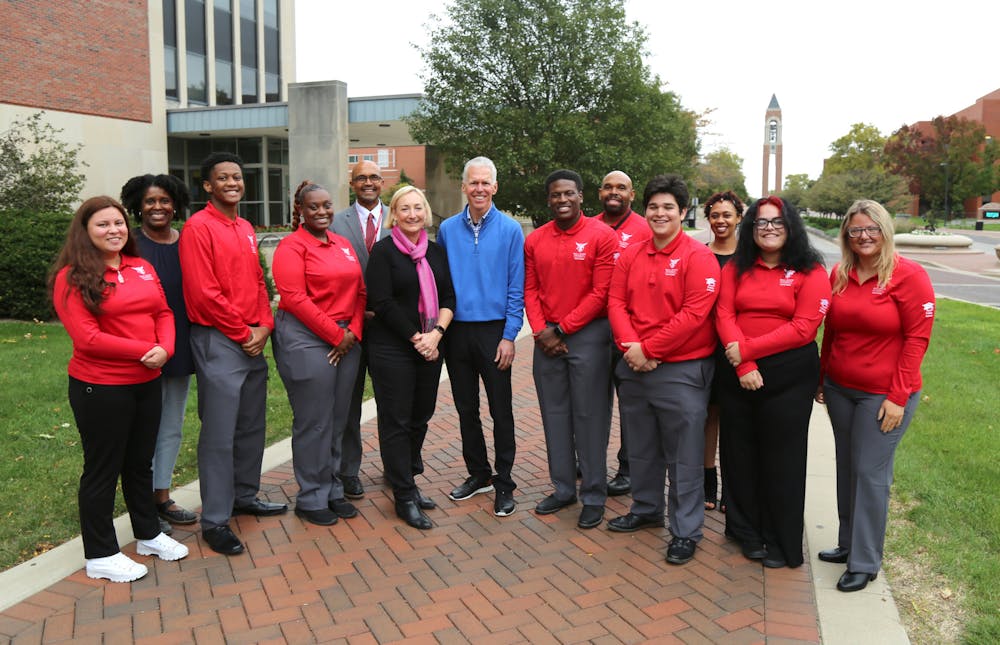Two Muncie Community Schools (MCS) graduates, a first for the program, were awarded scholarships as a part of the third round of the Ryan Family Scholars and Navigator Program.
The program is funded by a $1.45 million gift from Michelle Ryan, who graduated in 1981 with bachelor’s degrees in both elementary education and special education, and her husband Jim. It’s the largest philanthropic gift in Teachers College history, according to the program’s website.
The funds are, according to the organization, for a full-ride scholarship and connection to University-wide comprehensive student services to all Teachers College students, particularly those who are the first in their family to attend college and/or have financially challenging backgrounds.”
John Anderson, director of the Ryan Family Navigator Program and lecturer of sociology, has been working to grow the connections of the program to MCS and expand the program’s reach in order to expand the diversity of applicants. He said the connection is just the beginning as he looks to partner with other schools around the nation.
“One of the things that I wanted to do is build out these partnerships and see through this intentional outreach and building partnerships, how much does it add to the variety in our pool of applicants?” Anderson said.
Diversity stretches across many factors, according to Anderson, including gender identity, sexual orientation, lived socio-economic experience, race, ethnicity, and more.
Currently, the program is funded for seven years, with six scholars chosen each year for the scholarship and for the development of co-curricular services. Anderson said he and his team are still working to promote the program to those who could benefit from the services, which include professional development and additional culturally inclusive curriculum offerings.
“If you look at the prescribed curriculum or a course of study for teaching education majors, especially the elementary school and the special ed … [they have] very few elective opportunities,” Anderson said. “Then the curriculum itself doesn't have a strong and compelling culturally inclusive pedagogy or curriculum. Our co-curricular programming through the navigator program is to fill that gap.”
A recent program by the Ryan Family Navigator program was the book “Cultivating Genius: An Equity Framework for Culturally and Historically Responsive Literacy” by Gholdy E. Muhammad. In the workshop, led by Anderson, students were given the introduction and each chose a chapter to read and present alongside group discussions of the book.
“It was an opportunity to whet their appetite into culturally responsive pedagogy teaching and what that would mean,” said Anderson. “It was a way to get them some exposure in a co-curricular way that they wouldn't necessarily get in their prescribed course of study in their respective programs.”
The Navigators program is not limited to the Teachers College, but has services allowing any teaching education major to also receive additional programming and wraparound services provided from the original Ryan Family grant.
Beyond the program and the money is the students that make the program come alive, and hold the true stories of its value.
Jamie Johnson-Harris, a second-year elementary education major with an ESL concentration, was not sure of her future plans when she started her senior year of high school. After taking an early childhood education class, however, her future came into focus as she said her time spent working with preschoolers made her realize she wanted to work with children.
Her future goals have adapted further during her time at Ball State with aspirations of becoming a principal or a professor after spending time teaching.
“I just wanted to do something further beyond teaching,” said Johnson-Harris. “My professors here that teach my education classes are so kind and have given me a lot of good information and I'd love to do that for other college students too.”

When she applied for the program, she took advantage of the creative component by submitting a lyrical dance video and telling a bit about herself after her routine.
“I don't consider myself a writer,” said Johnson-Harris. “So when I found out you could do almost anything you wanted with it, that made it easier for me and less intimidating to apply for this big scholarship.”
The application let her share a different part of herself, which she still cultivates outside of her elementary education classes as a part of the Rhythms Dance Troupe (RDT), which practices jazz, lyrical, contemporary, tap and hip hop styles of dance.
Johnson-Harris took part in the earlier mentioned co-curricular programming as well as a trip with the scholars.
Anderson said he took the scholars on a trip last year to Detroit, MI. Students were able to see Charles H. Wright Museum of African American History, the Motown Museum and Birwood Wall (also known as Detroit Eight Mile Wall or Detroit's Wailing Wall), which is a monument of redlining in America.
“We got to learn about the background of the choice and culture,” said Johnson-Harris about the trip. “You get more opportunities beyond just [those] relating to education, which is a really cool aspect of the program.”
Another aspect of the program, beyond the trips and the funding, is the amount that the scholars give back to the community. A point that Josselline Valdez Salinas, a second year elementary education major, said was important to take into account.
“It's more than just a scholarship,” said Valdez Salinas. “We actually know each other and our pictures being on the wall for every first incoming freshman, or whoever, to feel welcome.”
A sense of welcome that is needed in a profession that Valdez Salinas said is often overlooked as many teachers put in the extra work beyond simply “loving their job.” An appreciation that seems to be shared with many of the scholars in the program, who often are doing more beyond the general curriculum.
Valdez Salinas is serving in the Army National Guard outside of classes. When she entered college, she had support from the military for school, but she said she needed a bit more help.

When she applied for the Navigators program in the second semester of her first year of college, she received a needed boost that will help her to continue to pursue the dreams she has had since she was a little girl. She said she used to play with her stuffed animals and pretend teaching them as she saw her teachers do. Especially teachers like her teacher in fifth grade, who pushed her toward teaching.
“She was just very sweet and loving and caring,” said Valdez Salinas. “I remember I was going through a lot of stuff with my parents … she was [the] kind of teacher who actually noticed. And I was like, I want to be like that. I didn't realize how much of an impact that teacher can make in a child's life, and she definitely made an impact on mine.”
In the future, Valdez Salinas said she would pursue a master's degree in education and sees herself making the same impact her teacher once did on her while teaching in an elementary school.
Her story of an impactful teacher is not the only one, as other scholars shared how being understanding, as Anderson hopes to guide the students to be, can make an impact. Another scholar, Alex Vivas, a fourth-year secondary English education major, also came to teaching through the actions of his prior teachers.
In his first year of high school, Vivas said that he was not someone who took school seriously. That year, he was struggling and school became a “place to unwind.” A writing assignment changed his perspective. As he struggled to write for weeks on end, his teacher asked him, “What are you afraid of?”
“I just poured my heart and what I was going through in it, everything that was happening at home, how it felt, how I was dealing with it,” Vivas said. “And I again had that moment of just exaltation of just getting those ideas out. And I remember turning it in and the next day, he came up to me and he [said] ‘Alex, this is brilliant.’”
The moment was a turning point for Vivas, who seemed to finally find a place to let his emotions out.
“I was like: ‘Oh, I'm heard. I'm actually heard in this space,’” Vivas said. “And then I started treating English classes like I have the ability to be heard. Every time I would go into an English class, I looked for moments where I could talk about my ideas, about anything, with anybody who was willing to listen. Stuff that I actually thought mattered.”

This includes the criminal justice system, which is an interest he has continued to pursue using the lens of education. Now, in between classes and teaching students in Hawaii remotely, he works with inmates at Pendleton Correctional Facility as a part of a GED program. He said he wants them to feel heard, which is why he also makes an effort to promote discussion during his classes.
“There's so many things that are inherently wrong in our criminal justice system,” Vivas said. “They just get taken advantage of and thrown away and forgotten about and that's a population that needs to learn that they don't have to be condemned … and so I spend that time with them.”
In pursuit of changing the system, Vivas said he is planning to go to law school, which he is studying for on the side, where he can learn law and combine his knowledge of education to make a difference. He is set to take the LSAT in November.
Before receiving the scholarship, Vivas was working two jobs to get through school and help out his mother. When he received the email about the scholarship in the summer before his sophomore year, he said he “wrote it off immediately,” thinking it wouldn’t be something he could get. It was a conversation with his mother, on a whim and a mere hour before the deadline, that led Vivas to change his mind. Despite the short deadline, his mother said he should apply.
“I rushed upstairs, I opened my laptop and I compressed years of everything that I had been already going through at that time,” said Vivas. “Everything I endured up until that point. I compressed all of that into one hour and I just wrote it into an essay. I just poured my heart into it. And that essay is so funny because it has spelling errors there. It's not a good essay, but it's genuine.”
Despite the errors, the selection team seemed to have seen this genuine nature of the essay, and Vivas received an email that sent him running downstairs to share the tale with his mother, who shared the moment of joy with her son.
“It was just so happy [for] both of us at the same time,” Vivas said. “I looked at her and I [said]: ‘Mom, you don't have to work, you don't have to worry about me.’ … I got so excited and she was so happy … and it took that risk [of applying] and doing it.”
Vivas said taking that risk of failure was worth it as the Ryan Family program gave him time to pursue his goals.
“I wouldn't have had time to dream,” Vivas said about his path before. “It is something that I've had the time to do now. I have the time to figure out what I want to do. I've had the time to hone in. I've had talks with Dr. Anderson that have focused [on] me. When I felt scattered, talks with him and everybody in that cohort would just gather all of that … and then I would be ready.”
Each of the scholars said Anderson and their cohort made a difference in their lives, whether it was from their group discussions, one-on-one conversations, or Anderson’s efforts to help the scholars explore opportunities.
Efforts such as donating the stipend he received as a faculty fellow for the Rinker Center for Global Affairs for Passport Saturday, where students were able to fill out their application for a passport, get a photo from the Rinker Center (which provides free passport photos for all students), and learned about the opportunities available to them such as student teaching in Germany.
A student who took up that opportunity was Vivas, who used his newly acquired passport to visit family in Colombia for the first time.
“He met that whole side of the family and that was the beginning of his own journey … beginning to do that kind of personal development work,” said Anderson. “There's three frames that we use in our program: personal development, student development and career development. We use those three frames to be able to add to us a level of clarity about the work.”
The opportunities and cohort the program provides ties the scholars together deeper than just funding their schooling. It creates a community that is driven to help one another and anyone willing to take the “risk,” just as Vivas said he did when he first applied to the program, risking the chance of not being accepted because he saw the greater opportunity.
“You can benefit from talking to any counselor on campus, but there is something unique about going to see somebody in this program,” said Vivas. “[They] sit down and talk [with you] about what your goals are, what your dreams are, and then that person takes a laptop, flicks it open and immediately starts to figure out how to get you there, how to get you on that track. And that's also something that's just really invaluable.”
Contact Abigail Denault with comments at abigail.denault@bsu.edu.


